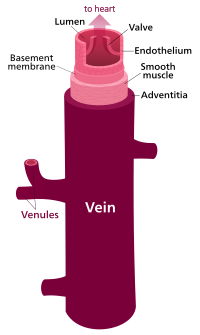
Photo from wikipedia
Background Progression of portal vein tumor thrombus directly affects the prognosis and treatment for patients with hepatocellular carcinoma; there are no data on the growth velocity of portal vein tumor… Click to show full abstract
Background Progression of portal vein tumor thrombus directly affects the prognosis and treatment for patients with hepatocellular carcinoma; there are no data on the growth velocity of portal vein tumor thrombus. We analyzed the growth velocity of portal vein tumor thrombus and its risk factors to propose the best timing of surgical treatment for hepatocellular carcinoma with portal vein tumor thrombus. Methods We retrospectively collected data on 57 hepatocellular carcinoma patients with portal vein tumor thrombus who underwent computed tomography twice preoperatively and hepatectomy between 2005 and 2015. To calculate the growth velocity of portal vein tumor thrombus, migration lengths of portal vein tumor thrombus were divided by the number of days. To identify risk factors for rapid growth of portal vein tumor thrombus, patients were classified according to the velocity: rapid (≥ 1.0 mm/day, n = 23) and slow (< 1.0 mm/day, n = 34). Results Median survival times of patients with portal vein tumor thrombus that invaded the ipsilateral second portal branch, ipsilateral first portal branch, and portal trunk were 42.9, 11.7, and 12.3 months, respectively. The average growth velocity of portal vein tumor thrombus was 0.9 ± 1.0 mm/day. Median estimated times required from ipsilateral second portal branch to ipsilateral first portal branch and ipsilateral first portal branch to portal trunk were 8.2 and 11.5 days, respectively. Liver fibrosis, alpha‐fetoprotein, and extent of portal vein tumor thrombus were independent risk factors for rapid progression of portal vein tumor thrombus. Proteins induced by vitamin K absence or antagonist II, extent of portal vein tumor thrombus, and liver fibrosis, not rapid growth of portal vein tumor thrombus, were independent prognostic factors. Conclusion An understanding of the rapid progression of portal vein tumor thrombus and its risk factors can be helpful in deciding an appropriate timing of surgical treatment for hepatocellular carcinoma with portal vein tumor thrombus.
Journal Title: Surgery
Year Published: 2018
Link to full text (if available)
Share on Social Media: Sign Up to like & get
recommendations!